Azure Cloud Engineers are integral to managing and maintaining cloud environments. They ensure that cloud infrastructure operates optimally and securely, adapting to the needs of businesses and their technological frameworks.
Skills necessary for an Azure Cloud Engineer include proficiency in Azure services, understanding of cloud architecture and security, and abilities in scripting and automation. Additionally, strong problem-solving and communication skills are important.
Candidates can write these abilities in their resumes, but you can’t verify them without on-the-job Azure Cloud Engineer skill tests.
In this post, we will explore 8 essential Azure Cloud Engineer skills, 9 secondary skills and how to assess them so you can make informed hiring decisions.
Table of contents
8 fundamental Azure Cloud Engineer skills and traits
The best skills for Azure Cloud Engineers include Azure Infrastructure, DevOps Practices, Security Management, PowerShell & CLI, Data Services, Monitoring Solutions, Cost Management and Scalability Techniques.
Let’s dive into the details by examining the 8 essential skills of a Azure Cloud Engineer.
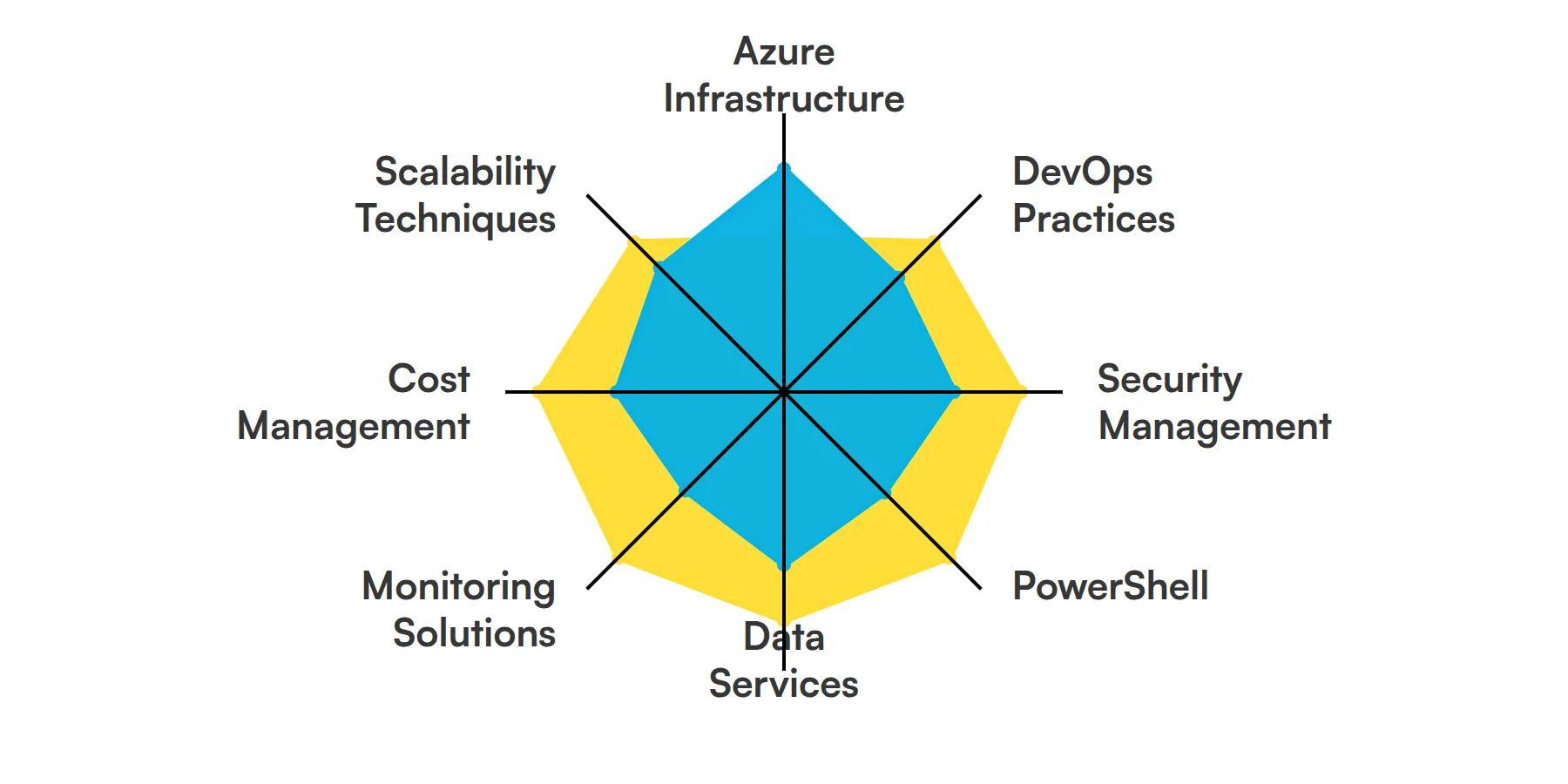
Azure Infrastructure
An Azure Cloud Engineer must be adept at designing, implementing, and managing virtual networks, VMs, and storage solutions in Azure. This skill is fundamental because it involves setting up the backbone of cloud services that support various applications and systems.
For more insights, check out our guide to writing a Cloud Engineer Job Description.
DevOps Practices
Implementing and managing continuous integration and continuous deployment (CI/CD) pipelines is crucial for an Azure Cloud Engineer. This skill ensures that software updates and infrastructure changes are deployed in a controlled and systematic manner, reducing downtime and errors.
Security Management
Understanding Azure's security tools and features, such as Azure Active Directory and Azure Security Center, is necessary for protecting data and applications in the cloud. An Azure Cloud Engineer uses this skill to configure security policies and manage access controls.
Check out our guide for a comprehensive list of interview questions.
PowerShell & CLI
Proficiency in scripting with PowerShell and Azure CLI helps automate repetitive tasks and orchestrate complex deployments. This skill is used by Azure Cloud Engineers to streamline cloud operations and enhance efficiency.
Data Services
Knowledge of Azure data services like Azure SQL Database, Cosmos DB, and Azure Data Lake is important for managing and scaling data in the cloud. This skill allows an Azure Cloud Engineer to implement robust data storage solutions that are scalable and performant.
For more insights, check out our guide to writing a Data Engineer Job Description.
Monitoring Solutions
Using Azure Monitor and Application Insights to track performance and health metrics is a key skill for an Azure Cloud Engineer. It enables proactive management of cloud resources and ensures optimal performance and availability.
Cost Management
An Azure Cloud Engineer must be skilled in cost optimization and budget management using tools like Azure Cost Management. This skill helps in monitoring, controlling, and optimizing the expenditure on Azure resources.
Scalability Techniques
Understanding how to scale applications and services effectively in Azure ensures that the cloud infrastructure can handle varying loads. This skill is critical for maintaining performance and availability during demand spikes.
9 secondary Azure Cloud Engineer skills and traits
The best skills for Azure Cloud Engineers include Containerization, Hybrid Cloud, AI and Machine Learning, Compliance Knowledge, Networking, Disaster Recovery, Automation Tools, Project Management and API Management.
Let’s dive into the details by examining the 9 secondary skills of a Azure Cloud Engineer.
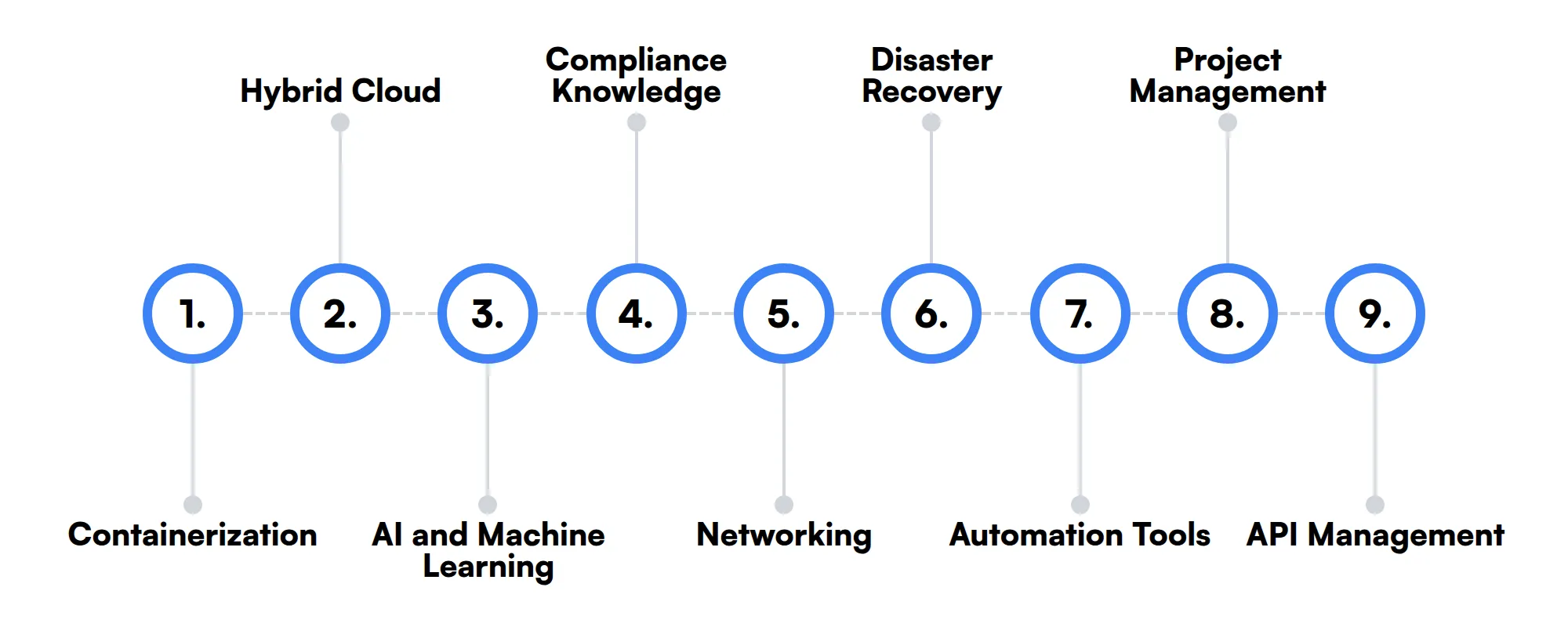
Containerization
Experience with Docker and Kubernetes helps in deploying and managing containerized applications, which are increasingly popular for their efficiency and portability.
Hybrid Cloud
Knowledge of integrating on-premises infrastructure with Azure services is beneficial for organizations adopting a hybrid cloud strategy.
AI and Machine Learning
Familiarity with Azure AI tools and machine learning frameworks can be advantageous for implementing advanced analytics and intelligent features in applications.
Compliance Knowledge
Understanding regulatory compliance requirements relevant to Azure deployments is important for ensuring that the cloud solutions adhere to legal and corporate standards.
Networking
Skills in managing Azure's networking features like VPNs, ExpressRoute, and load balancers are important for ensuring optimal connectivity and performance.
Disaster Recovery
Ability to design and implement disaster recovery strategies using Azure ensures business continuity and data protection in case of system failures.
Automation Tools
Proficiency in using Azure automation tools and services like Azure Logic Apps and Azure Automation can streamline workflows and reduce manual intervention.
Project Management
Experience in managing projects, particularly in cloud migrations and deployments, helps in ensuring that implementations are completed on time and within budget.
API Management
Skills in managing APIs through Azure API Management service enable secure and efficient handling of API traffic in cloud applications.
How to assess Azure Cloud Engineer skills and traits
Assessing the skills and traits of an Azure Cloud Engineer requires a comprehensive approach that goes beyond just reviewing resumes. While a resume can highlight an engineer's experience with Azure Infrastructure, DevOps Practices, and Security Management, it doesn't provide a complete picture of their practical abilities or how they handle real-world challenges.
To truly understand a candidate's proficiency, it's important to use skills-based assessments that focus on their hands-on experience with tools like PowerShell & CLI, as well as their knowledge of Data Services and Monitoring Solutions. These assessments can reveal how well a candidate can manage costs and implement scalability techniques, which are crucial for optimizing cloud environments.
One effective way to evaluate these skills is through Adaface on-the-job skill tests, which can help you achieve a 2x improved quality of hires. By using these tailored assessments, you can ensure that your candidates are not only technically proficient but also a good fit for your organization's specific needs.
Let’s look at how to assess Azure Cloud Engineer skills with these 6 talent assessments.
Microsoft Azure Online Test
Our Microsoft Azure Online Test evaluates a candidate's ability to work with Azure's cloud services, including virtual machines, web and mobile apps hosting, and network security.
The test assesses their understanding of Azure compute options, storage solutions, and networking capabilities.
Successful candidates demonstrate a strong grasp of Azure security measures, data warehousing, and the ability to implement scalable cloud architectures.
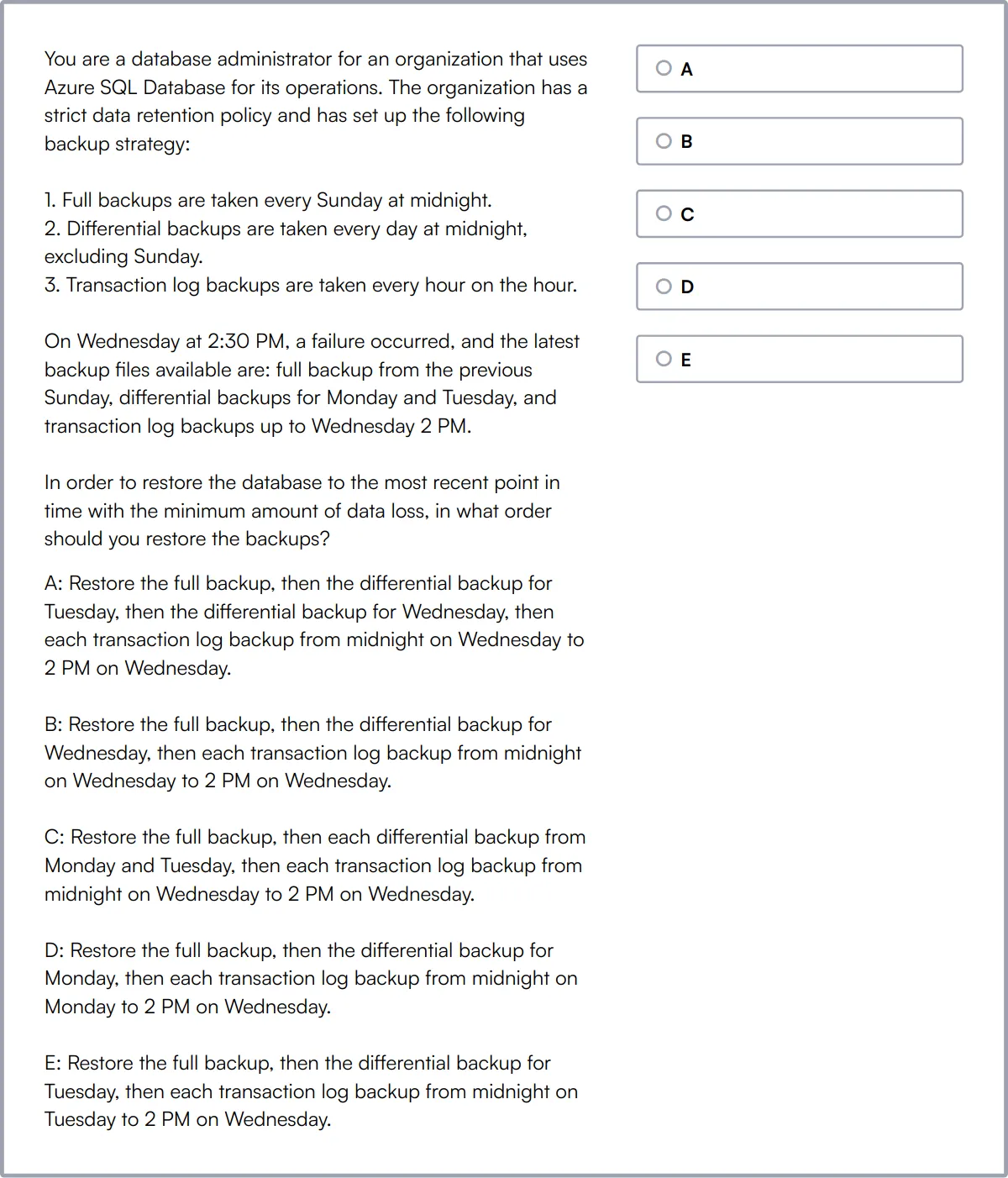
DevOps Test
Our DevOps Test is designed to assess a candidate's proficiency in key DevOps practices and tools such as Git, Docker, Linux, and Python.
This test challenges candidates to apply their knowledge in real-world scenarios involving continuous integration, containerization, and version control.
Candidates who perform well on this test are adept at using DevOps methodologies to improve software development and operational processes.
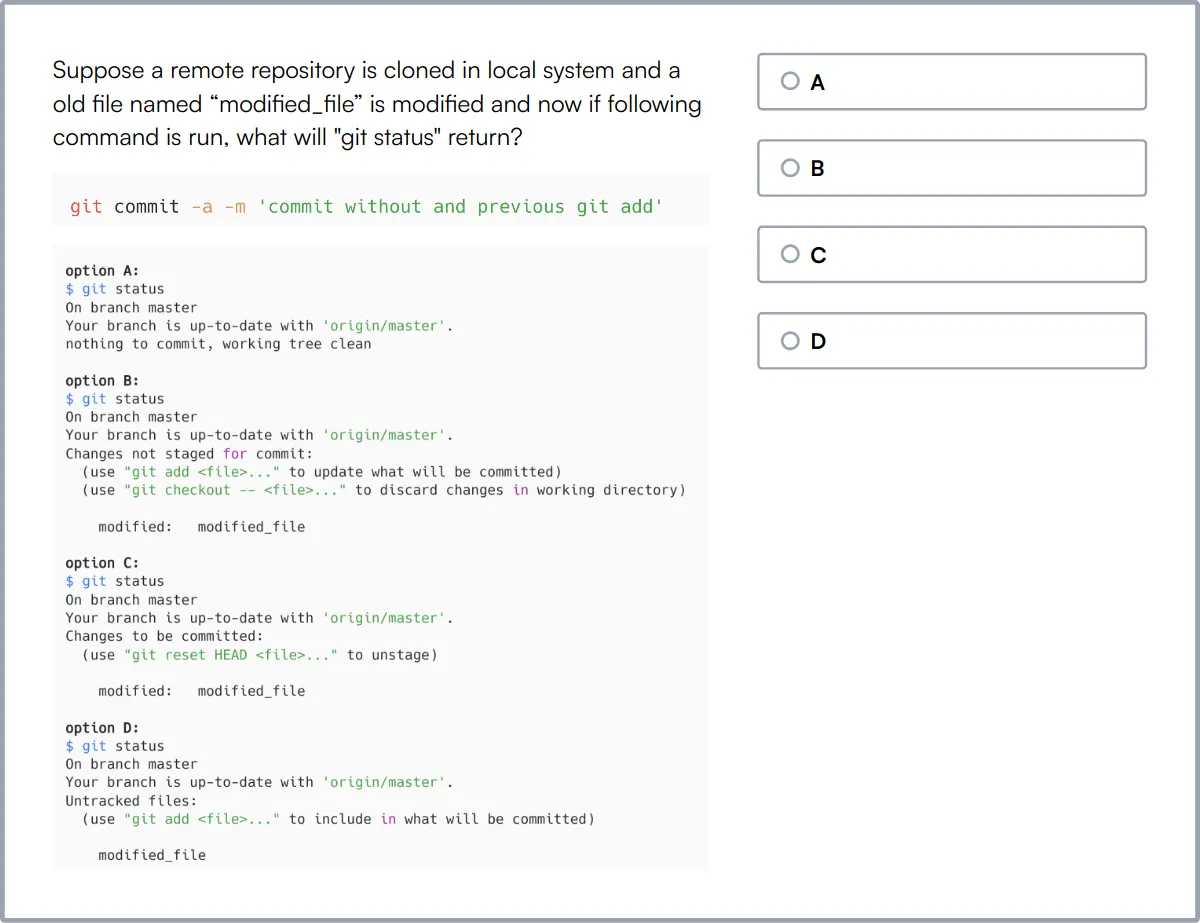
Cyber Security Assessment Test
Our Cyber Security Assessment Test evaluates candidates on their ability to secure networks and manage cybersecurity threats.
The test covers network security, attack detection, cryptography, and web security.
High-scoring candidates will have a thorough understanding of cybersecurity defenses, risk assessments, and the ability to implement effective security protocols.
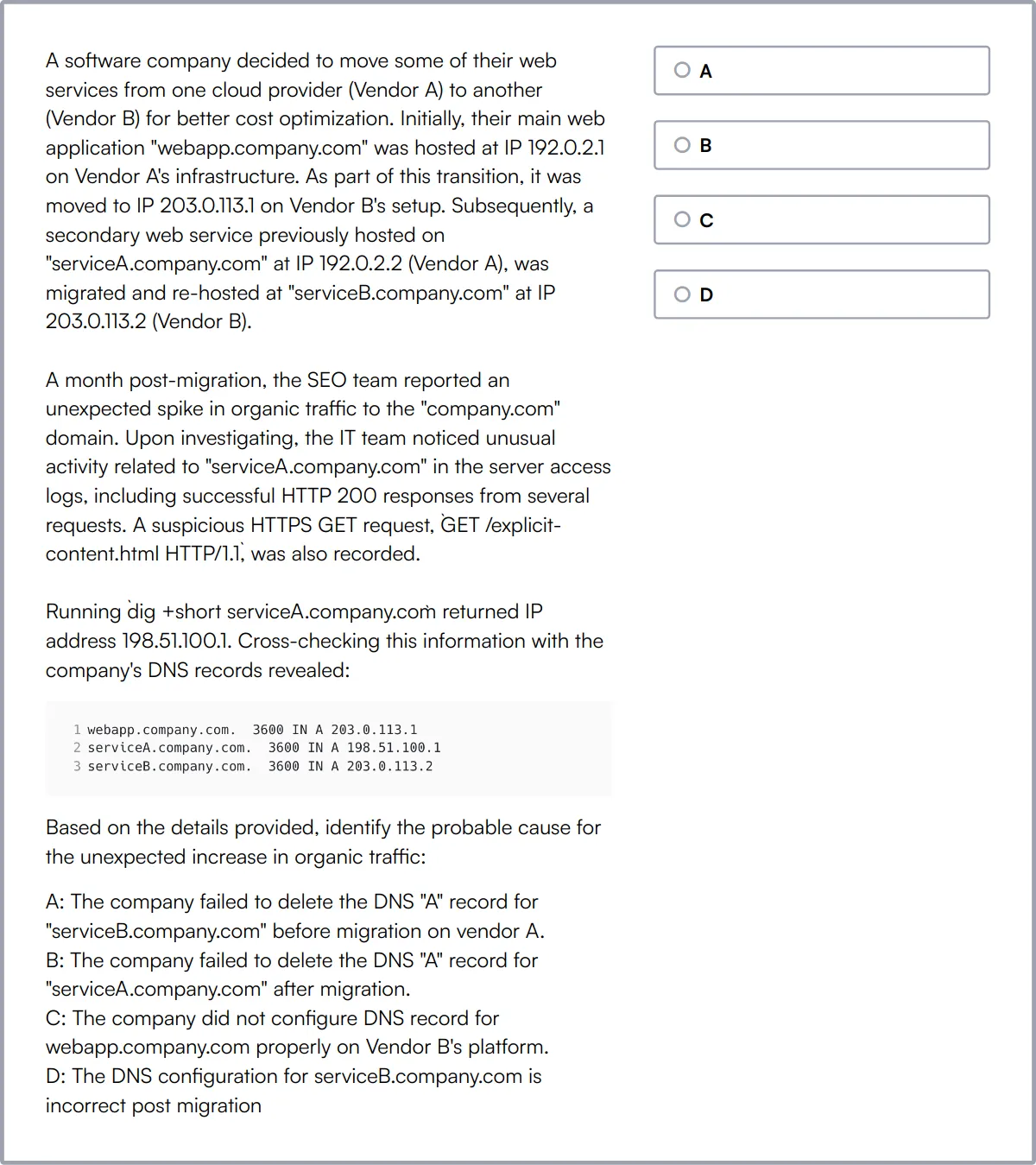
PowerShell Online Test
Our PowerShell Online Test assesses candidates on their ability to script and automate tasks using PowerShell in Windows environments.
Candidates are tested on their knowledge of PowerShell scripting, module management, and system security.
Those who excel in the test are proficient in automating and streamlining administrative tasks, enhancing system efficiency.
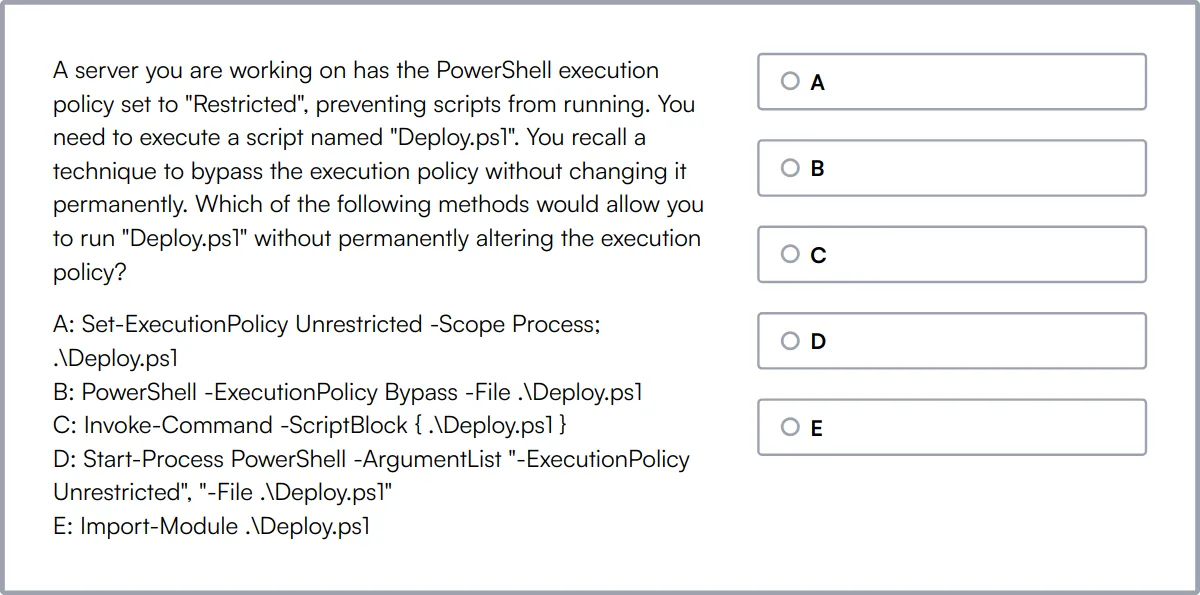
Data Engineer Test
Our Data Engineer Test gauges a candidate's expertise in data architecture, including data warehousing, ETL processes, and database design.
The test evaluates their ability to handle data operations from modeling to analysis and visualization.
Effective candidates demonstrate strong skills in building scalable data systems and optimizing data storage and retrieval processes.

Elasticsearch Test
Our Elasticsearch Test assesses a candidate's ability to manage and operate Elasticsearch environments.
This test evaluates their skills in data indexing, search optimization, and cluster management.
Candidates who score well are proficient in enhancing search capabilities and ensuring efficient data retrieval and scalability.
Summary: The 8 key Azure Cloud Engineer skills and how to test for them
| Azure Cloud Engineer skill | How to assess them |
|---|---|
| 1. Azure Infrastructure | Evaluate ability to design and manage Azure resources and services. |
| 2. DevOps Practices | Assess skills in implementing CI/CD pipelines and automation. |
| 3. Security Management | Check proficiency in securing Azure environments and managing identities. |
| 4. PowerShell & CLI | Test command-line skills for automating Azure tasks and configurations. |
| 5. Data Services | Review expertise in managing Azure databases and data solutions. |
| 6. Monitoring Solutions | Gauge ability to implement and use Azure monitoring tools. |
| 7. Cost Management | Assess skills in optimizing and managing Azure costs effectively. |
| 8. Scalability Techniques | Evaluate knowledge in designing scalable Azure applications and services. |
Cloud Computing Online Test
Azure Cloud Engineer skills FAQs
What skills are necessary for an Azure Cloud Engineer?
An Azure Cloud Engineer should have skills in Azure Infrastructure, DevOps Practices, Security Management, PowerShell & CLI, Data Services, and Monitoring Solutions.
How can recruiters assess Azure Infrastructure skills?
Recruiters can assess Azure Infrastructure skills by evaluating candidates' experience with Azure Resource Manager, virtual networks, and storage solutions. Practical tests or scenario-based questions can be useful.
Why is DevOps important for Azure Cloud Engineers?
DevOps practices help Azure Cloud Engineers streamline development and operations, enabling continuous integration and delivery. This ensures faster deployment and better collaboration.
What role does PowerShell & CLI play in Azure management?
PowerShell & CLI are used for automating tasks and managing Azure resources. Proficiency in these tools allows engineers to efficiently script and execute complex operations.
How do Azure Cloud Engineers ensure security management?
Azure Cloud Engineers ensure security by implementing identity management, access controls, and encryption. They also monitor security alerts and compliance with industry standards.
What is the significance of containerization in Azure?
Containerization allows for consistent application deployment across environments. Azure supports container services like Kubernetes, which help in scaling and managing applications.
How can recruiters evaluate a candidate's knowledge of AI and Machine Learning in Azure?
Recruiters can assess this by asking about experience with Azure Machine Learning, cognitive services, and data analytics. Practical tests or project discussions can provide insights.
What are the key aspects of cost management in Azure?
Cost management involves monitoring resource usage, setting budgets, and optimizing workloads to reduce expenses. Engineers use Azure Cost Management tools to track and manage costs.

40 min skill tests.
No trick questions.
Accurate shortlisting.
We make it easy for you to find the best candidates in your pipeline with a 40 min skills test.
Try for freeRelated posts
Free resources



